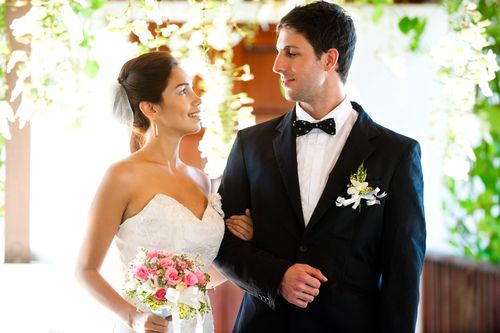 Writing the perfect words can be a big challenge for many wedding officiants. When you’re tasked with conducting the nuptials of a couple you care about, you want to ensure your speech appropriately reflects their relationship. However, there are a handful of phrases that tend to be included in most ceremonies. Sayings like “by the authority vested in me” and “I now pronounce you” are familiar, but you might not know how to use them or what they even mean.
Writing the perfect words can be a big challenge for many wedding officiants. When you’re tasked with conducting the nuptials of a couple you care about, you want to ensure your speech appropriately reflects their relationship. However, there are a handful of phrases that tend to be included in most ceremonies. Sayings like “by the authority vested in me” and “I now pronounce you” are familiar, but you might not know how to use them or what they even mean.
If you want a little inspiration on how to create your speech, take a look at these examples of common sayings that you can work into the mix. Though far from essential, using these phrases can add a sense of authority to your words.
Dearly Beloved
The first phrase uttered by many officiants is usually “dearly beloved.” This is an opener that immediately addresses the guests in both a formal and personal way. The saying essentially means “those who are loved deeply.” While you can use alternatives like “friends and family” or “ladies and gentlemen,” these don’t quite capture the same energy. Since the phrase is almost exclusively used for nuptial ceremonies, there’s no real reason to deviate from the formula.
By the Power Vested in Me
Another common saying that comes up during nuptials is “by the power vested in me.” The officiant often says some variation of these words, but the purpose might not always be clear. While anyone can become a wedding officiant, only someone who is licensed to perform weddings can conduct a ceremony that is legally binding. By uttering this phrase during the ceremony, the officiant is letting the crowd know that what is happening is real.
Basically, this phrase indicates that a certain authority has provided the right to conduct the event. For religious officials, this would be a higher power of some sort. For religious performers and county workers, the power comes from the application and approval process. Regardless of the origin, the saying is meant to showcase authority.
I Now Pronounce You
Immediately following the phrase “by the power vested in me by the state of,” the officiant usually says something along the lines of “I now pronounce you…” and announces the couple’s titles. For heterosexual couples, for example, the minister will say “I now pronounce you husband and wife,” or some variation thereof. This is a straightforward saying, being the officiant’s proclamation that the ceremony was a success and the couple’s union has been made official.
May You…
Toward the end of the event, the officiant often delivers a few kind words to the couple before dismissing the crowd and ending the ceremony. There are many ways to structure this, though one common way is to use the phrase “may you.” An officiant might say something along the lines of “may you go in light and love” or “may this union remain forever as strong as it has proven on this day.” Wishing luck and fortune is a simple and sweet way for the officiant to add a personal blessing to the event.
Final Considerations
While hearing “by the power vested in me” wedding sayings might be quite common, there is no rule declaring that officiants need to include each and every example when they are writing their own speeches. Since you are the one who has been asked to conduct the ceremony, it falls on your shoulders to exercise discretion and select the most fitting phrases for the couple of honor.
Writing a wedding speech can be a challenge for plenty of officiants. However, review some examples of common words and phrases to provide the insight you need to make your speech sound official and appropriate.
Add Your Comment